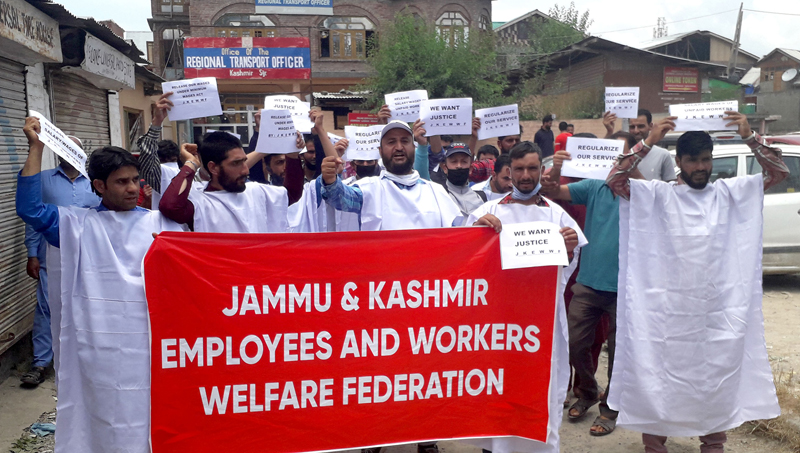Excelsior Correspondent
Srinagar, July 11: J&K Employees and Workers Welfare Federation (JKEWWF) today held a protest demonstration at RTO office Srinagar demanding regularization and the implementation of minimum wages policy
The JKEWWF urged the UT Government to draw a comprehensive permanent regularizing and wages policy for more than 60,000 daily wagers, who have been engaged with various departments of JK including Transport, PDD, PHE, PWD, UEED, Local Bodies, Housing, Floriculture and Agriculture, Forest and others.
“A cabinet decision made by the previous collation government drafted out a new regularization policy under SRO-520(date and order reference), which has been by and large rejected by the daily wagers as against their interests,” it said.
The JKEWWWF demands revival and amendment of the SRO-64 of 1994 and adopt the same guidelines for the regularization of all daily rated workers.
The protestors said that the Administrative Council has recently issued orders for the regularization of the services of ReT teachers in the education department, “which is a welcome step but the daily wagers particularly employed with essential service departments who despite being vulnerable to risks continue their duties have been yet again ignored,” they said.
They said that thousands of daily wagers are not being paid their due wages. They alleged that some of them receive their wages on festivals only once or twice in a calendar year and even some of them are deprived of that also.
In the current scenario of the global pandemic, the Union government recently issued guidelines to the state and UT governments throughout India to compensate and rehabilitate migrant workers living in their territories who are being affected by the nationwide lockdown.
“The Govt, however, has done remarkable and commendable efforts to accommodate the registered migrant workers, but unfortunately, no compassion has been shown by the state government towards the thousands of poor daily wagers,” they said.
The JKEWWF appealed to the authorities to provide a similar pattern of ration and other facilities to the families of these daily rated workers who despite not being paid work continuously as a vital arm of the state essential services.


